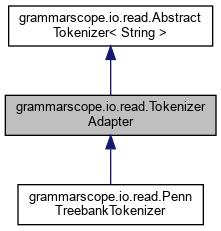 |
GrammarScope
4.0.0
|
 |
GrammarScope
4.0.0
|


Public Member Functions | |
| TokenizerAdapter (final StreamTokenizer st) | |
| String | getNext () |
| void | setEolString (final String eolString) |
| boolean | isEol (final String str) |
 Public Member Functions inherited from grammarscope.io.read.AbstractTokenizer< String > Public Member Functions inherited from grammarscope.io.read.AbstractTokenizer< String > | |
| T | next () |
| boolean | hasNext () |
| void | remove () |
| T | peek () |
| List< T > | tokenize () |
Protected Attributes | |
| final StreamTokenizer | st |
| String | eolString = "<EOL>" |
 Protected Attributes inherited from grammarscope.io.read.AbstractTokenizer< String > Protected Attributes inherited from grammarscope.io.read.AbstractTokenizer< String > | |
| T | nextToken |
Additional Inherited Members | |
 Protected Member Functions inherited from grammarscope.io.read.AbstractTokenizer< String > Protected Member Functions inherited from grammarscope.io.read.AbstractTokenizer< String > | |
| abstract T | getNext () |
This class adapts between a java.io.StreamTokenizer and a edu.stanford.nlp.process.Tokenizer.
| grammarscope.io.read.TokenizerAdapter.TokenizerAdapter | ( | final StreamTokenizer | st | ) |
Create a new TokenizerAdaptor. In general, it is recommended that the passed in StreamTokenizer should have had resetSyntax() done to it, so that numbers are returned as entered as tokens of type String, though this code will cope as best it can.
| st | The internal java.io.StreamTokenizer |
| String grammarscope.io.read.TokenizerAdapter.getNext | ( | ) |
Internally fetches the next token.
| boolean grammarscope.io.read.TokenizerAdapter.isEol | ( | final String | str | ) |
Say whether the String is the end-of-line token for this tokenizer.
| str | The String being tested |
| void grammarscope.io.read.TokenizerAdapter.setEolString | ( | final String | eolString | ) |
Set the String returned when the inner tokenizer returns an end-of-line token. This will only happen if the inner tokenizer has been set to eolIsSignificant(true).
| eolString | The String used to represent eol. It is not allowed to be null (which would confuse line ends and file end) |
|
protected |
|
protected |
 1.8.17
1.8.17